Mechanical Systems
A mechanical system is a collection of interconnected components that work together to perform a specific task. These systems use mechanical energy to accomplish various functions, such as moving, lifting, or transforming materials.
Key Components of Mechanical Systems
- Input: The force or energy applied to the system
- Mechanical elements: Such as gears, levers, pulleys, and wheels
- Output: The result of the system's operation, such as movement or the application of force
Examples of Mechanical Systems
There are numerous examples of mechanical systems in everyday life, including:
- A bicycle, with its gears, chains, and wheels
- A crane, which uses pulleys and levers to lift heavy objects
- An escalator, which employs a combination of gears, belts, and motors to move people between floors
Study Tips for Understanding Mechanical Systems
To better understand mechanical systems, consider the following study tips:
- Learn about simple machines, such as levers, pulleys, and inclined planes, and how they are used in mechanical systems
- Explore real-world examples of mechanical systems and analyze how they function
- Understand the concept of mechanical advantage and how it applies to different types of systems
Conclusion
Understanding mechanical systems is crucial for grasping the fundamental principles of engineering and physics. By studying the components, functions, and applications of these systems, you can gain valuable insights into the world of mechanics and technology.
.◂Science Worksheets and Study Guides Fourth Grade. Cells- The building blocks of living things
Study Guide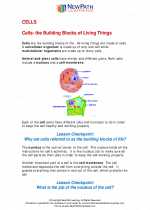 Cells- The building blocks of living things
Cells- The building blocks of living things  Activity Lesson
Activity Lesson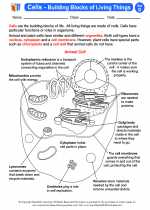 Cells - Building Blocks of Living Things
Cells - Building Blocks of Living Things  Worksheet/Answer key
Worksheet/Answer key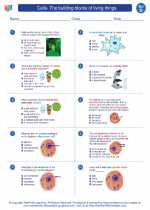 Cells- The building blocks of living things
Cells- The building blocks of living things  Worksheet/Answer key
Worksheet/Answer key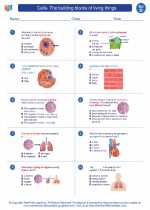 Cells- The building blocks of living things
Cells- The building blocks of living things  Worksheet/Answer key
Worksheet/Answer key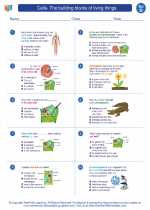 Cells- The building blocks of living things
Cells- The building blocks of living things  Worksheet/Answer key
Worksheet/Answer key Cells - The Building Blocks of Living Things
Cells - The Building Blocks of Living Things  Worksheet/Answer key
Worksheet/Answer key Focus In
Focus In  Vocabulary/Answer key
Vocabulary/Answer key Cells- The building blocks of living things
Cells- The building blocks of living things  Vocabulary/Answer key
Vocabulary/Answer key Cells- The building blocks of living things
Cells- The building blocks of living things  Vocabulary/Answer key
Vocabulary/Answer key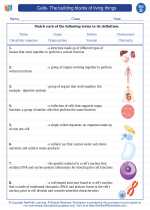 Cells- The building blocks of living things
Cells- The building blocks of living things 

 Activity Lesson
Activity Lesson
 Worksheet/Answer key
Worksheet/Answer key
 Worksheet/Answer key
Worksheet/Answer key
 Worksheet/Answer key
Worksheet/Answer key
 Worksheet/Answer key
Worksheet/Answer key
 Worksheet/Answer key
Worksheet/Answer key
 Vocabulary/Answer key
Vocabulary/Answer key
 Vocabulary/Answer key
Vocabulary/Answer key
 Vocabulary/Answer key
Vocabulary/Answer key

The resources above cover the following skills:
The Living Environment: Students understand that cells are the basic unit of life, that all life as we know it has evolved through genetic transfer and natural selection to create a great diversity of organisms, and that these organisms create interdependent webs through which matter and energy flow. Students understand similarities and differences between humans and other organisms and the interconnections of these interdependent webs.
Cells: Students describe how living things are made up of one or more cells and the ways cells help organisms meet their basic needs.
Give examples of organisms that consist of a single cell and organisms that are made of a collection of cells.